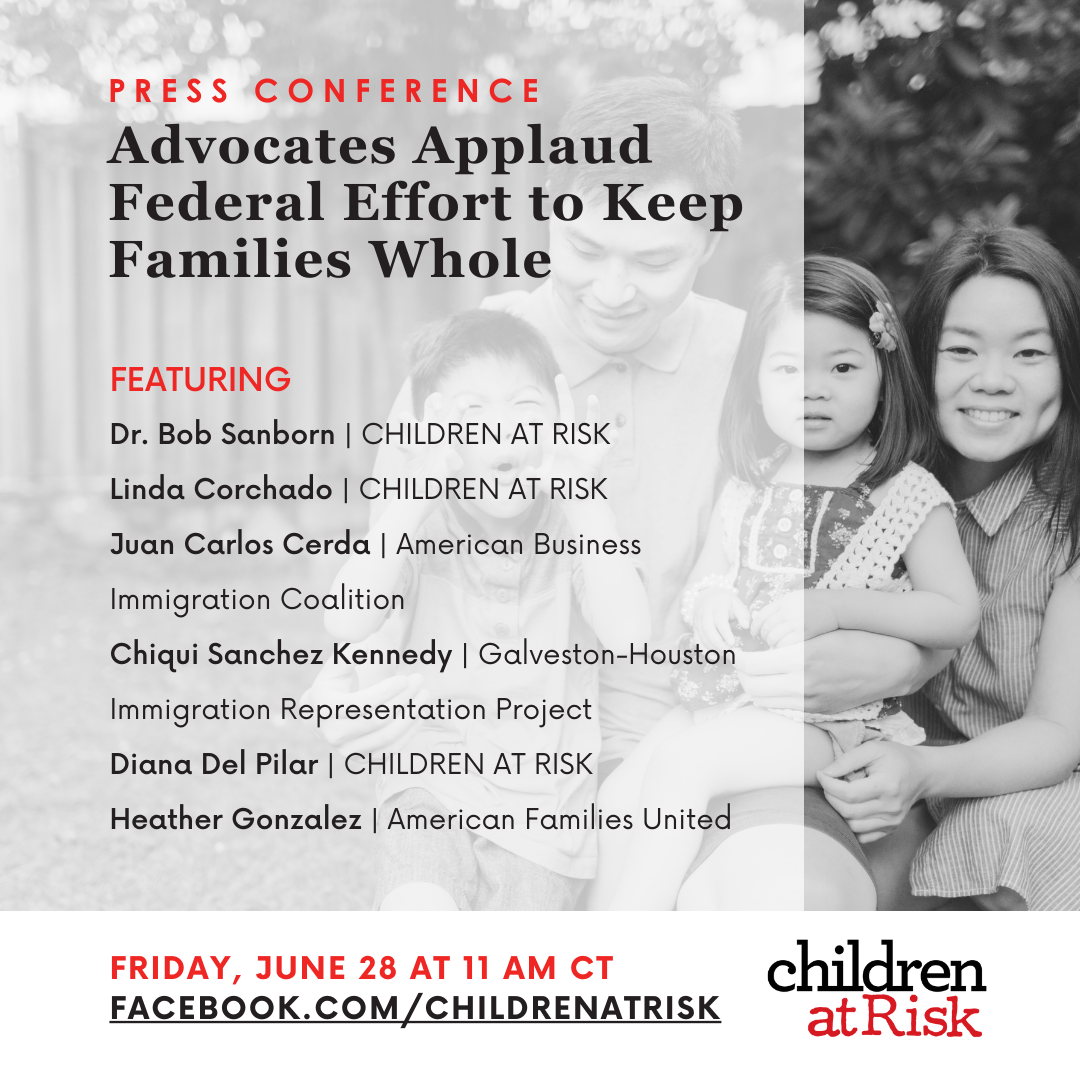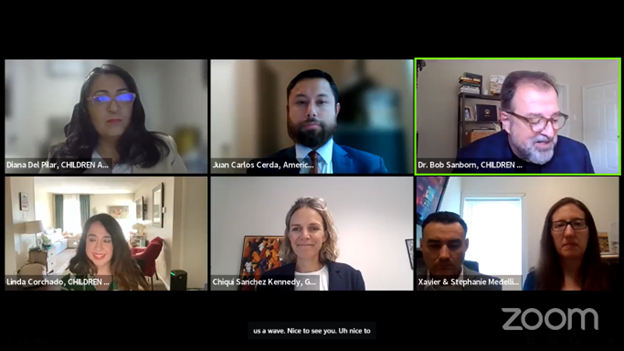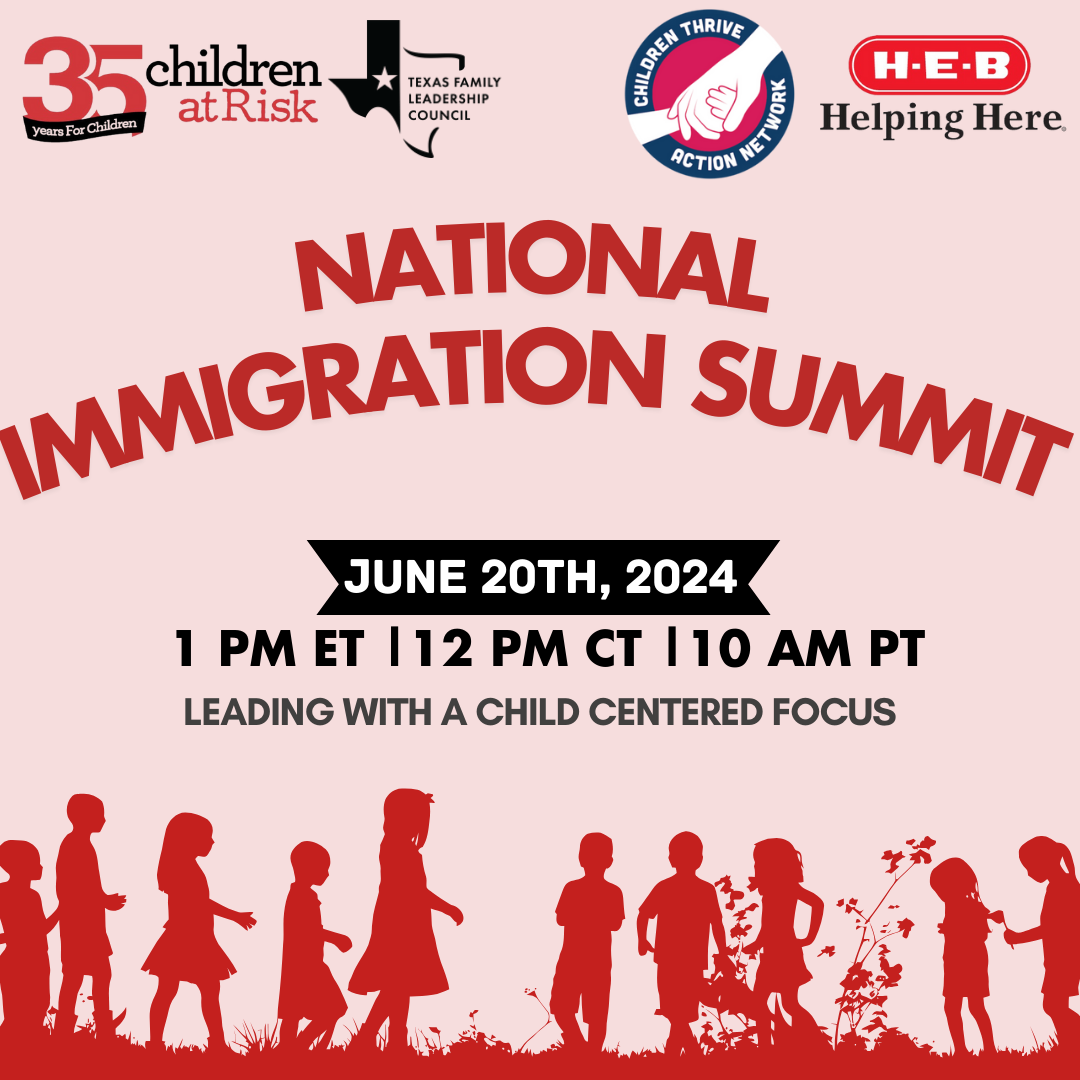
The Children’s Immigration Network is CHILDREN AT RISK’s effort to focus on children of immigrants. Our vision is for the state of Texas to offer a welcoming environment for immigrants and refugees where children of immigrants can integrate and access the resources they need to learn, grow and thrive. While the diversity of our immigrant community enriches our state, it also adds complexity to the strategies needed to address their varied needs.
NEW HOPES COME WITH A NEW SCHOOL YEAR
By: Linda Corchado, Senior Director of the Children’s Immigration Network

academic school year. With new beginnings also comes hope and immigrant families everywhere got a huge dose it just a few weeks ago when news broke of revamped federal efforts to keep families together for spouses of U.S. citizens. Families can start applying for permanent residency as early as August 19, 2024.
These efforts underline central tenets we espouse at CHILDREN AT RISK: all children, no matter their status, should not be separated from their parents, guardians and caregivers who create a loving and safe home and upbringing.
Another tenet is children’s unequivocal right to a free public education. This newsletter we hear from our partners at USCRI who are working hard to ensure immigrant families are equipped with the right tools and information to enroll their students in school. These next few weeks are critical to ensure families are informed and empowered to access our school systems.
All children need champions to live whole and fulfilling lives and here at the Children’s Immigration Network, we celebrate the educators who welcome them, the policy makers who protect their rights and the powerful groups who help ensure those right remain vibrant and unencumbered.
For children!
DATA PROFILE

According to the CDC, childhood vaccinations are crucial in preventing an estimated 4 million deaths globally each year, underscoring the importance of maintaining high vaccination rates. Texas, as the second-largest state in the U.S., plays a critical role in public health to ensure that all children in Texas are healthy and adequately protected against preventable diseases.
However, newcomer children may have difficulty accessing essential services including vaccinations. A survey conducted by CHILDREN AT RISK among service providers in the Houston area revealed that 41% of respondents identified missing paperwork, including vaccination records, as a significant barrier to school enrollment. This issue highlights the challenges that many newcomer families face in navigating the complex requirements for entering the education system.
In light of these challenges, it is vital to prioritize the availability of vaccinations for all children, including newcomers, to ensure public health safety. Schools play a crucial role in supporting students, providing access to vaccinations on school premises to facilitate their school enrollment, and providing necessary translation services for families equipped with vaccination records from their home countries. By doing so, we can empower newcomer students to integrate more successfully into the education system and access vital services.
PARTNER PROFILE
This month we are profiling the work of U.S. Committee for Refugees and Immigrants
Profile: Jose Elizindo, Program Manager for the South-Central region, USCRI Home Study and Post Release Services Program for Unaccompanied Children
U.S. Committee for Refugees and Immigrants
Established in 1911, the U.S. Committee for Refugees and Immigrants (USCRI) is a non-profit organization dedicated to supporting the needs and rights of refugees and immigrants. USCRI, along with its affiliates, provides legal, social, and health services to refugees, unaccompanied migrating children, trafficking survivors, and other immigrants in all 50 U.S. states, as well as in El Salvador, Honduras, Kenya, and Mexico. The organization also advocates for refugee and immigrant rights at both national and international levels, influencing policies, practices, and laws.
Home Studies and Post-Release Services
Since 2005, USCRI has provided legal and case management services to unaccompanied children arriving in the U.S. These services aim to reunite children with family or sponsors quickly and safely. Vulnerable children receive home assessments and follow-up services to ensure a secure environment and successful integration. The Home Study and Post-Release Services program meets children’s physical, cognitive, social, and emotional needs, through case managers who assist with school enrollment and connecting families to essential resources. Each year, USCRI and its partners serve over 25,000 children and their sponsors nationwide.
How is USCRI bridging the gap between families and schools?
USCRI’s Post Release Services (PRS) program, including our partner agency YMCA International in Houston, serves unaccompanied immigrant children who newly arrived in the U.S. to help support their safety, connection to resources, and successful integration into their new communities. Our PRS workers play an important role in educating children and their caregivers about their educational rights, providing families with information about the enrollment process, and advocating when barriers arise during the enrollment process or after enrollment. Among other things, PRS workers are ensuring that children have the proper enrollment paperwork and receive necessary medical follow-up including vaccines for school. They often physically accompany families to schools to facilitate the enrollment process when needed, as children and caregivers often face challenges and resistance from schools when they do not have the common documents or information requested (insufficient proof of address, being enrolled by an adult who is not their parent/legal guardian, etc.).
How does USCRI engage schools when it comes to tackling enrollment barriers?
USCRI is bridging the gap between families and schools through its dedicated efforts in training and education. Our Community Outreach and Education team conducts public-facing workshops and targeted presentations aimed at equipping school staff with increased knowledge and understanding of the unaccompanied children population and best practices for supporting youth in school, with the goal of improving outcomes for children by ensuring that school staff are well-prepared to meet the unique needs of these students. Additionally, our UC Resource Center website (ucresourcecenter.org) offers a wealth of information for providers, including school staff.
What makes the biggest positive impact when it comes to creating a smooth registration process for newcomer students?
USCRI recommends that schools focus on the following:
- Continued Professional Development to Understand Unique Needs: Ensuring school staff are aware of the unique barriers unaccompanied and other immigrant children may face in the school enrollment process, strategies for overcoming barriers, and the latest federal policies and guidelines. USCRI’s Community Outreach and Education team is available to provide targeted trainings/workshops for school staff on these topics.
- Awareness of Federal Guidelines: Understanding immigrant students’ educational rights and federal protections.
- Language Access: Providing interpretation services and ensuring proper language access for non-English speaking students and their families.
- Inclusive Curriculum: Testing newcomer students for English proficiency and providing the necessary ELL/ESL supports from day one. Offering a curriculum that is inclusive and sensitive to the diverse backgrounds of newcomer students.

IN CASE YOU MISSED IT

In Case You Missed It… CHILDREN AT RISK Hosts Advocates in Support of Recent Executive Orders on Immigration
CHILDREN AT RISK convened with other advocates to celebrate the new federal, child-forward, executive orders on immigration while exploring the impact on Texas children and the state’s economy on June 28, 2024. Over 10% of all Texas children live in a mixed-status household, representing 22-51% of all families within Texas’ major metro areas.
On June 18, the Federal Administration released new orders centered on Parole in Place and revised guidance on the DACA D-3 Waiver Program, potentially restabilizing 304,4016 Texas families and bolstering economic mobility for over 66,368 non-citizen spouses of Texas citizens, who on average, have resided in the United States for 24 years.
Over half of this population (52%) care for at least one child in their household under the age of 18.These executive orders will foster economic well-being, promote healthy development, and boost academic performance by mitigating exposure to traumatic events during children’s key developmental stages. Most public-school educators (84%) have interacted with students who’ve expressed concern over immigration enforcement and 70% have seen a tangible decline in academic performance.
These executive orders will foster economic well-being, promote healthy development, and boost academic performance by mitigating exposure to traumatic events during children’s key developmental stages. Most public-school educators (84%) have interacted with students who’ve expressed concern over immigration enforcement and 70% have seen a tangible decline in academic performance.
“This change represents a significant step forward to impede harm, keep families together, and inspire hope for so many children in our state,” said Linda Corchado, Senior Director of Immigration at CHILDREN AT RISK.

Press Conference Participants included Dr. Bob Sanborn, CHILDREN AT RISK, Linda Corchado, CHILDREN AT RISK, Juan Carlos Cerda, American Business Immigration Coalition (ABIC), Chiqui Sanchez Kennedy, Galveston-Houston Immigration Representation Project (GHIRP), Xavier Medellin, American Families United, Stephanie Medellin, American Families United, Diana Del Pilar, CHILDREN AT RISK.
National Immigration Summit
This fifth annual Immigration Summit explored the unique challenges facing immigrant children and their families. We gathered together to learn about child-forward immigration policies, access to basic needs and mental health resources, education, and how to center children in the narrative surrounding immigrants and immigration. Our summit brought together child advocates and experts from across the nation!
This summit is in partnership with the Texas Family Leadership Council (TXFLC), The Texas Racial Equity Collaborative (TREC), the Center for Law and Social Policy (CLASP,) DiversifiED Consulting, The Michigan Immigrant Rights Center, the New York Immigration Coalition (NYIC), and American Families United and sponsored by the Children Thrive Action Network (CTAN) and H-E-B.

Resilience and Community Care Toolkit
United We Dream’s new Resilience and Community Care Toolkit! This toolkit is designed to support immigrant justice organizers and leaders with community-based healing care tools we can incorporate into our daily organizing. United We Dream’s hope is that, as we take on a big fight ahead, we can rely on our spiritual resilience practices to become more powerful and embodied leaders.
In the Resilience and Community Care Toolkit for Immigrant Justice Leaders, you’ll find:
-
A step-by-step process on how to lead a community care circle for your local community
-
Mindful breathing techniques, including tips to activate our rest & digest response
-
Traditional care practices for energetic replenishment and more!